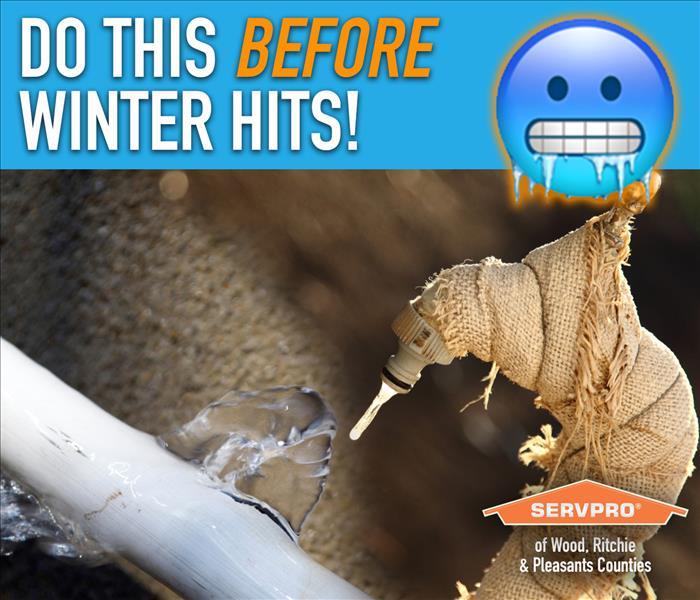How to Avoid Frozen Pipes This Winter (MUST do This BEFORE Winter Comes)
9/28/2020 (Permalink)
Article at a glance:
- 2 Reasons You Don’t Want Frozen Pipes in Your Family Home
- 3 MUST DO things for your Indoor Pipes
- 1 MUST DO and two optional things for your Outdoor Spigots
Frozen pipes costs West Virginian families hundreds of thousands of dollars in damages each year. A burst pipe can lead to a flooded basement, which leads to a potential insurance bill of over $20,000. Your actions can avoid this happening to your family home by doing some very simple actions.
First, let’s understand what can come from a frozen pipe. Don’t skip to the next section or you might miss some important information.
- NO RUNNING WATER. Frozen pipes mean your faucet trickles, instead of a nice flow. This can be financially dangerous as time goes on. Each time you turn on the water, the water might be backing up in the pipe and seeping into the supporting walls. Damaging them slowly and/or providing an environment for mold to thrive.
- EXPLODING PIPES. When our pipes freeze, a significant amount of pressure can build up between the faucet and blocked pipe. When this continues to increase, the likelihood your pipes are going to explode continues to increase. This explosion wreaks havoc in your home, from the basement to the supporting walls.
You do not want this inconvenience to happen to you or your family. This remediation process can be not only expensive but timely too. By following this checklist you will be able to dramatically minimize the likelihood of water damage from frozen pipes in your home.
- Keep your home warm. Turning up the heat in your house can do wonders for the pipes hidden in your walls or floors. Allowing heat into usually cold rooms will help the pipes stay frost free all winter long.
- Leave doors open. If you have pipes under sinks, or exposed pipes in your cabinetry, leave the doors open. This will help warmer air circulate around the pipes, and keep them warm.
- Switch off the water. This one is vital! Doing something as simple as turning off an unused water supply to your garden can help your outdoor pipes and hoses stay defrosted. Try to get into the habit of switching your water on outside only when you need it.
3 Simple Steps to Avoid Up to $10,000 in Damages from a Frozen Spigot
It is important to note that once pipes burst you will need professional assistance. If the worst case happens, be ready with towels and tape to temporarily slow the flow of water while you wait for the experts. If you notice any signs of frozen pipes such as slow water, follow our tips or reach out.
If you have any further questions please call us on 304 428 7378 or click here to contact us.
The Team at SERVPRO of Wood, Ritchie & Pleasants Counties.
Related Articles:
WATCH NOW: Avoid $10,000 in Flooding Damages in Under 2 minutes





 24/7 Emergency Service
24/7 Emergency Service
